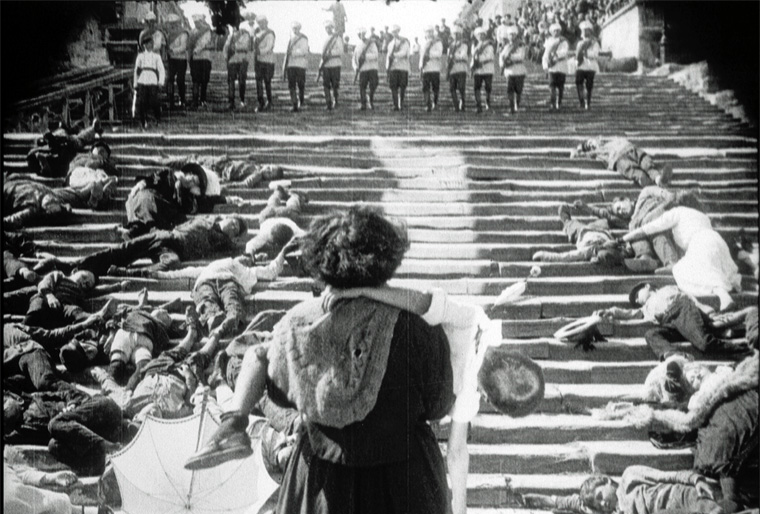More than 90 years after its first screening, the Edison Studio collective of composers reinterprets the images of the Battleship Potëmkin through a soundtrack in which music, voices, ambient sounds reveal the atmosphere, the senses and the secret rhythms of the masterpiece by Ejzenštejn.
BATTLESHIP POTEMKIN (1925) Бронено́сец «Потёмкин»
directed by Sergej Michajlovič Ėjzenštejn
screenplay by Nina Agadžanova-Šutko, Sergej Michajlovič Ėjzenštejn – cinematography by Eduard Tisse, scenes by Vasili Rachals
starring Alexandre Antonov, Vladimir Barskij, Grigori Aleksandrov, Levchenko Repnikova, Alexandre Levshin, Andrei Fajt, Ivan Bobrov, Marusov, Michail Gomarov
duration 68′
first movie projection Moscow, December 24, 1925, Bolshoi Theatre
Soundtrack by Edison Studio
music and sound design Luigi Ceccarelli, Fabio Cifariello Ciardi, Alessandro Cipriani and Vincenzo Core
voices Andrey Maslenkin and Svetlana Kevral – double bass Giacomo Piermatti – electric guitar Vincenzo Core
extra foley Paolo Frati and Simone Frati, mixing and mastering 5.1 Edison Studio, encoding DTS Filippo Bussi, Tweedle, Attigliano
thanks to Maurizio Argentieri and Giulio Latini for their cooperation.
Edison Studio production
![]() with the support of Società Italiana Autori ed Editori for the project “SIAE – classici di oggi”
with the support of Società Italiana Autori ed Editori for the project “SIAE – classici di oggi”
and Fondazione Cineteca di Bologna
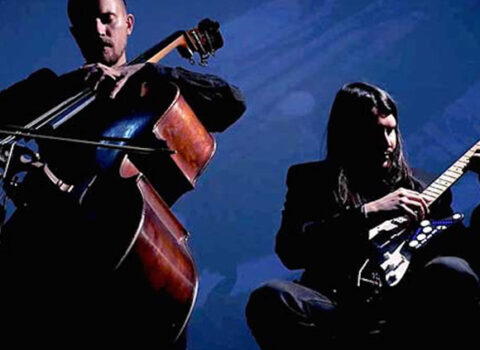
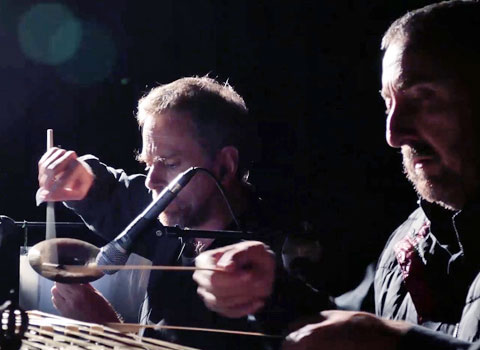
“… the resonance of the materials of the objects that are the protagonists of some historical shots […] the echo of metals from the gears […] and on the famous staircase of Odessa a rain of sounds interspersed with silences that have shown even the less attentive music is not made only by sound …. “
(A. Welcome, www.exibart.com 1/11/2017)
live performances
October 25, 2017 – Napoli (Italy), Cinema Astra, Associazione Alessandro Scarlatti, Scarlatti Contemporanea
January 28, 2018 – Cagli (Italy), teatro comunale
January 29, 2018 – Rovereto (Italy), MART, Museum of Modern Art
June 13, 2018 – Ravenna, Teatro Rasi, Ravenna Festival
October 13 – 2018, Matera, Casa Cava Auditorium, MA/IN 2018, Matera Intermedia Festival, Matera 2019
November 11, 2018, Roma, Maxxi – Auditorium, Romaeuropa Festival
November 30, 2018 – Firenze, Tempo Reale Festival 2018 – Suono Vivo, Teatro Cantiere Florida
July 30, 2019 – Moscow (Russia), Multimedia Hall of the electroacoustic Music Center of the Moscow Conservatory
December 6, 2019 – Moscow (Russia) – XVI Festival “Autumn in Moskow”, Auditorium of the Center of the Russian Composers
September 19, 2021 – Vitlycke (Sveden) – Here 2021, Festival of the performing Arts, Vitlycke Center for the Performing Arts
November 20, 2022 – Terni – Terni Film Festival edition 18, cinema Cityplex
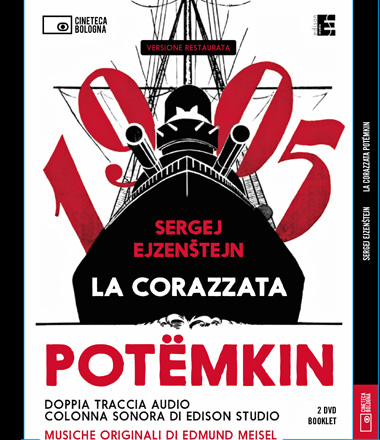
“Battleship Potemkin” is published on DVD with Edison Studio soundtrack by “Cineteca di Bologna”
Year: 2017
2 Dvd with booklet (68’+119’ / 80 pp.)
price: 19.90 16.90 €
with double audio track
– soundtrack by Edison Studio (DTS 5.1 e stereo)
– original music by Edmund Meisel
In this DVD a new wonderful restoration of the original version of The Battleship Potëmkin is presented with a double audio track, including the original music by Edmund Meisel (1925) and the music by Edison Studio (2017).
review
Potemkin’s enterprise
Let’s say it without fear. A beautiful film like “Battleship Potemkin” has not yet been made. A similar refined riot of highly advanced images, a similar enthralling homage to the revolutionary self-enhancement of the proletarian masses.
Could one think of another soundtrack conceived according to the criteria and ideas that circulate in today’s “experimental” (multiform) music and that at
the same time would create a soundtrack for much of the film?
Edison Studio has accomplished the feat. They hired two Russian actors, captured their voices on texts taken from the original Russian captions, multiplied the computer voices for the choral scenes. Here is a real “new” Potemkin.
The horrid sadistic commander of the ship
is heard shouting his invectives and his orders to sentence the sailors to death who refuse to eat spoiled meat. Vakulinchuk, the sailor leading the mutiny, is heard cheering on his comrades. Vakulinchuk who ends up killed and, ashore, in front of the port of Odessa, is celebrated as the hero of the revolution.
The footsteps of the firing squad (which will not fire) on the deck of the ship and of the
Tsarist guards massacring the crowd on the staircase are heard as rhythm.
Perhaps the purists will have something to say. But Edison Studio’s taste is perfect and the charm of this vision is overwhelming. And the music? The electroacoustics that exist beyond the sound effects of the actions performed in the film are very musical, top notch. Drums, electric guitar, double bass, balafon, metal plates and digital processing of recorded sounds. Splendid free percussive sequences, some glitchy reminiscences and incredible inventiveness in the frenetic “jagged continuum” of the scenes where the battle against the Tsarist fleet is prepared on the self-managed Potemkin.
(Mario Gamba – Il Manifesto – ALIAS – 13 January 2018)
DVD Notes
According to Klejman, this extraordinary film represents the culmination of the twentieth-century artistic avant-garde because Ejzenštejn brings together the discoveries of new artistic movements and the classical tradition. “In the spring of 1925, the German censors tried to prevent Potemkin’s theatrical release fearing that a film about the 1905 Revolution in Russia could arouse revolutionary feelings in Germany with its emotional force. In much of Europe, Asia and South America the censors were no less short-sighted and fearful than their German colleagues, so much that Bronenosec Potemkin was banned for a long time. Only after the Second World War did it return to circulation.
At the 1958 exhibition in Brussels it was at the top of the list of the twelve best films of all time, and has
since been considered an undisputed masterpiece of global importance.
“Today Bronenosets Patyomkin appears to us no less alive and involving than ninety years ago. And the main theme of the film retains all its relevance: alongside the Freedom and Equality of humanity, brotherhood, the renunciation of violence, the recognition of the bond that binds us all on Earth is necessary.” (Naum Klejman). Thanks to the efforts made by the archives of Russia, Germany, Great Britain and the United States and the work of film historians and directors, it was possible to restore the original versions of Ejzenštejn’s film.
The work by Edison Studio composers offers a re-interpretation of the movie through the fusion of music, voices in Russian language, electroacoustic and environmental sounds unveiling athmospheres,
senses and secret rhythms of Ejzenštejn’s masterpiece.
For the composition of the new original soundtrack Edison Studio composers have studied Ėjzenštejn’s complex editing techniques, his theories about audiovisual montage and the various visual rhythm types he used in his movie.
It’s a complex and dense soundtrack, which aims at rendering the power of the faces expressions, of gestures, of suspensions, accelerations, symbols, internal and external rhythms, and of the deeply human dimension in which the action of masses and people unravels. Music and sound intertwine in counterpoint with the visual editing in various ways in the 5 acts of the film, re-inventing its audiovisual form in a contemporary way.
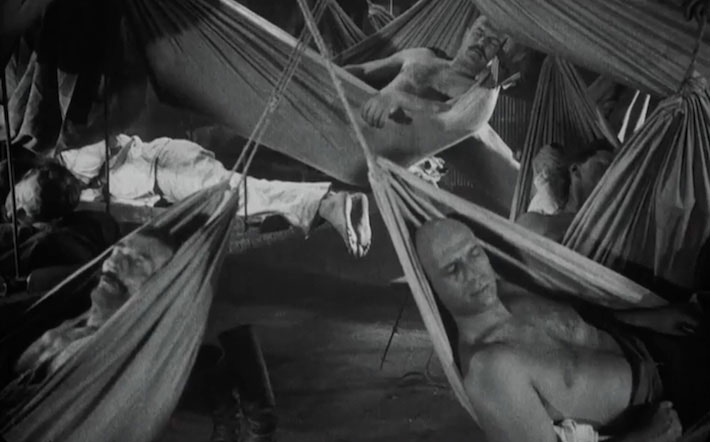
Music and sound intertwine and counterpoint the visual montage in different ways in the 5 acts of which the work is composed, reinventing the audiovisual form in a contemporary sense.
The original versions of Ėjzenštejn’s film are presented in the new DVD of the Cineteca di Bologna with a double audio track, containing the music of Edison Studio and the original music of Edmund Meisel.


